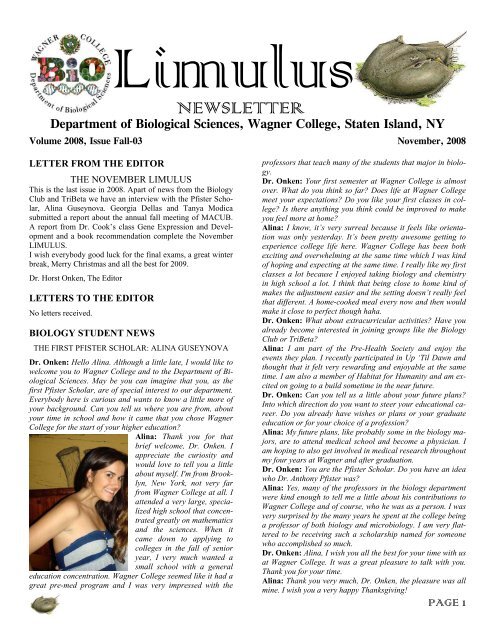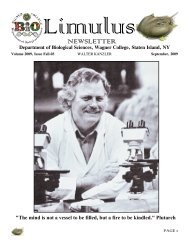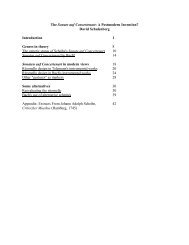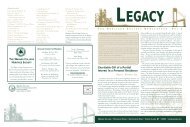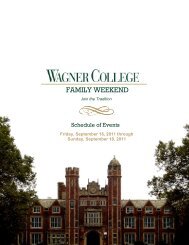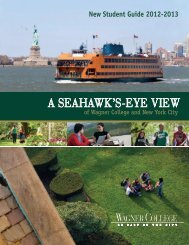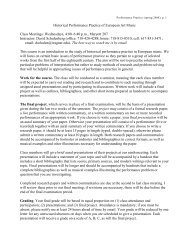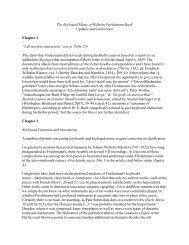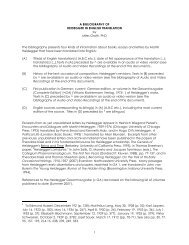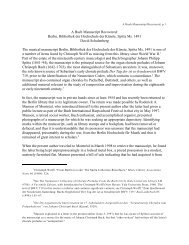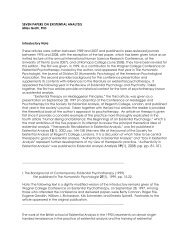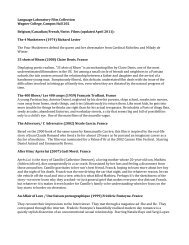Department of Biological Sciences, Wagner College, Staten Island, NY
Department of Biological Sciences, Wagner College, Staten Island, NY
Department of Biological Sciences, Wagner College, Staten Island, NY
You also want an ePaper? Increase the reach of your titles
YUMPU automatically turns print PDFs into web optimized ePapers that Google loves.
Limulus<br />
NEWSLETTER<br />
<strong>Department</strong> <strong>of</strong> <strong>Biological</strong> <strong>Sciences</strong>, <strong>Wagner</strong> <strong>College</strong>, <strong>Staten</strong> <strong>Island</strong>, <strong>NY</strong><br />
Volume 2008, Issue Fall-03 November, 2008<br />
LETTER FROM THE EDITOR<br />
THE NOVEMBER LIMULUS<br />
This is the last issue in 2008. Apart <strong>of</strong> news from the Biology<br />
Club and TriBeta we have an interview with the Pfister Scholar,<br />
Alina Guseynova. Georgia Dellas and Tanya Modica<br />
submitted a report about the annual fall meeting <strong>of</strong> MACUB.<br />
A report from Dr. Cook’s class Gene Expression and Development<br />
and a book recommendation complete the November<br />
LIMULUS.<br />
I wish everybody good luck for the final exams, a great winter<br />
break, Merry Christmas and all the best for 2009.<br />
Dr. Horst Onken, The Editor<br />
LETTERS TO THE EDITOR<br />
No letters received.<br />
BIOLOGY STUDENT NEWS<br />
THE FIRST PFISTER SCHOLAR: ALINA GUSEYNOVA<br />
Dr. Onken: Hello Alina. Although a little late, I would like to<br />
welcome you to <strong>Wagner</strong> <strong>College</strong> and to the <strong>Department</strong> <strong>of</strong> <strong>Biological</strong><br />
<strong>Sciences</strong>. May be you can imagine that you, as the<br />
first Pfister Scholar, are <strong>of</strong> special interest to our department.<br />
Everybody here is curious and wants to know a little more <strong>of</strong><br />
your background. Can you tell us where you are from, about<br />
your time in school and how it came that you chose <strong>Wagner</strong><br />
<strong>College</strong> for the start <strong>of</strong> your higher education?<br />
Alina: Thank you for that<br />
brief welcome, Dr. Onken. I<br />
appreciate the curiosity and<br />
would love to tell you a little<br />
about myself. I'm from Brooklyn,<br />
New York, not very far<br />
from <strong>Wagner</strong> <strong>College</strong> at all. I<br />
attended a very large, specialized<br />
high school that concentrated<br />
greatly on mathematics<br />
and the sciences. When it<br />
came down to applying to<br />
colleges in the fall <strong>of</strong> senior<br />
year, I very much wanted a<br />
small school with a general<br />
education concentration. <strong>Wagner</strong> <strong>College</strong> seemed like it had a<br />
great pre-med program and I was very impressed with the<br />
pr<strong>of</strong>essors that teach many <strong>of</strong> the students that major in biology.<br />
Dr. Onken: Your first semester at <strong>Wagner</strong> <strong>College</strong> is almost<br />
over. What do you think so far? Does life at <strong>Wagner</strong> <strong>College</strong><br />
meet your expectations? Do you like your first classes in college?<br />
Is there anything you think could be improved to make<br />
you feel more at home?<br />
Alina: I know, it’s very surreal because it feels like orientation<br />
was only yesterday. It’s been pretty awesome getting to<br />
experience college life here. <strong>Wagner</strong> <strong>College</strong> has been both<br />
exciting and overwhelming at the same time which I was kind<br />
<strong>of</strong> hoping and expecting at the same time. I really like my first<br />
classes a lot because I enjoyed taking biology and chemistry<br />
in high school a lot. I think that being close to home kind <strong>of</strong><br />
makes the adjustment easier and the setting doesn’t really feel<br />
that different. A home-cooked meal every now and then would<br />
make it close to perfect though haha.<br />
Dr. Onken: What about extracurricular activities? Have you<br />
already become interested in joining groups like the Biology<br />
Club or TriBeta?<br />
Alina: I am part <strong>of</strong> the Pre-Health Society and enjoy the<br />
events they plan. I recently participated in Up ‘Til Dawn and<br />
thought that it felt very rewarding and enjoyable at the same<br />
time. I am also a member <strong>of</strong> Habitat for Humanity and am excited<br />
on going to a build sometime in the near future.<br />
Dr. Onken: Can you tell us a little about your future plans?<br />
Into which direction do you want to steer your educational career.<br />
Do you already have wishes or plans or your graduate<br />
education or for your choice <strong>of</strong> a pr<strong>of</strong>ession?<br />
Alina: My future plans, like probably some in the biology majors,<br />
are to attend medical school and become a physician. I<br />
am hoping to also get involved in medical research throughout<br />
my four years at <strong>Wagner</strong> and after graduation.<br />
Dr. Onken: You are the Pfister Scholar. Do you have an idea<br />
who Dr. Anthony Pfister was?<br />
Alina: Yes, many <strong>of</strong> the pr<strong>of</strong>essors in the biology department<br />
were kind enough to tell me a little about his contributions to<br />
<strong>Wagner</strong> <strong>College</strong> and <strong>of</strong> course, who he was as a person. I was<br />
very surprised by the many years he spent at the college being<br />
a pr<strong>of</strong>essor <strong>of</strong> both biology and microbiology. I am very flattered<br />
to be receiving such a scholarship named for someone<br />
who accomplished so much.<br />
Dr. Onken: Alina, I wish you all the best for your time with us<br />
at <strong>Wagner</strong> <strong>College</strong>. It was a great pleasure to talk with you.<br />
Thank you for your time.<br />
Alina: Thank you very much, Dr. Onken, the pleasure was all<br />
mine. I wish you a very happy Thanksgiving!<br />
PAGE 1
BIOLOGY CLUB NEWS<br />
The Biology Club made again a field trip to the Arthur Kill<br />
shore cleaning<br />
the Blazing Star<br />
Burial Ground<br />
and the shore<br />
line. Apart <strong>of</strong><br />
old tires and oil<br />
barrels the major<br />
part <strong>of</strong> the<br />
trash was plastic<br />
bottles that have<br />
been inadequatelydisposed.<br />
When collecting these bottles it was easy to recognize<br />
their different ages. Evidently they drift around the New York<br />
water ways for different times until they are flooded onto the<br />
shore.<br />
Contributed by Dr. Onken<br />
TRI BETA NEWS<br />
Tri-Beta will be hosting the annual faculty luncheon on Monday<br />
December 1 between 11am and 1pm in the 4th floor break<br />
room! Feel free to stop by and enjoy some delightful treats or<br />
bring some to share. Also if there is anything you would like<br />
to contribute to the society that would be wonderful! We look<br />
forward to seeing you there!<br />
Thank you!<br />
Ryan Rogers<br />
Tri-Beta President<br />
OPPORTUNITIES<br />
RESEARCH WITH MOSQUITOES AND CRABS<br />
Dr. Onken <strong>of</strong>fers research<br />
opportunities for<br />
students in the frame <strong>of</strong><br />
a project in which he<br />
collaborates with scientists<br />
from Washington<br />
State University, the University <strong>of</strong> Idaho, and the University<br />
<strong>of</strong> Alberta (Edmonton, CA). The project is funded by the National<br />
Institute <strong>of</strong> Health and studies the physiology <strong>of</strong> the<br />
midgut <strong>of</strong> larval yellow fever mosquitoes (Aedes aegypti).<br />
Mosquitoes are vectors <strong>of</strong> a number <strong>of</strong> parasites, transmit devastating<br />
diseases like malaria, yellow fever and dengue, and<br />
are a major threat to the health <strong>of</strong> billions <strong>of</strong> people on our<br />
planet. The principal investigators <strong>of</strong> this project address larval<br />
mosquitoes, because it appears more straightforward to<br />
fight these vectors as long as they are confined in an aquatic<br />
habitat.<br />
In collaboration with colleagues from the U.S. (Mt. Desert <strong>Island</strong><br />
<strong>Biological</strong> Laboratories, Maine), Brazil (University <strong>of</strong> São<br />
Paulo in Ribeirão Preto, University <strong>of</strong> Paraná in Curitiba) and<br />
Canada (University <strong>of</strong> Manitoba in Winnipeg) Dr. Onken pursues<br />
research with Crustacea related to the osmoregulatory capacities<br />
and mechanisms <strong>of</strong> crabs. Together with Dr. Alauddin<br />
The Newsletter <strong>of</strong> the <strong>Department</strong> <strong>of</strong> <strong>Biological</strong> <strong>Sciences</strong>, <strong>Wagner</strong> <strong>College</strong><br />
(Chemistry) and Pr<strong>of</strong>essor<br />
Beecher (Biology),<br />
an ecophysiological<br />
study is in an early<br />
stage <strong>of</strong> planning.<br />
Dr. Onken can <strong>of</strong>fer research<br />
opportunities for<br />
two to three students. If<br />
interested contact Dr. Onken in his <strong>of</strong>fice (Megerle Science<br />
Hall Room 411), lab (Megerle Science Hall Room 406) or via<br />
e-mail (horst.onken@wagner.edu) or phone 420-4211.<br />
Contributed by Dr. Onken<br />
EXPERIENCES<br />
41 st MACUB CONFERENCE<br />
Our trip to Montclair State University in<br />
Montclair, New Jersey for this year's<br />
MACUB conference was one that we<br />
will never forget. Upon hearing that we<br />
were signed up to present a poster on<br />
our research we had been working on<br />
since this past summer, feelings <strong>of</strong> both<br />
excitement and nervousness filled our<br />
minds--Will we be able to efficiently<br />
present these results to other students<br />
and pr<strong>of</strong>essors? Considering this was<br />
the first biology conference for both <strong>of</strong><br />
us, we did not know what to expect but<br />
wanted it to be an event to look back on<br />
and be proud <strong>of</strong>.<br />
Seeing all the participants from the different<br />
colleges with their posters depicted<br />
the various types <strong>of</strong> research<br />
ranging in environmental, physiological,<br />
genetic even to microbiological was a<br />
great sight to see. All <strong>of</strong> the pr<strong>of</strong>essors<br />
who stopped by were cordial and interested<br />
in what we were presenting. What<br />
was even better was that we were able<br />
to answer their questions, which gave us<br />
a great feeling <strong>of</strong> accomplishment.<br />
MACUB has prepared us for future<br />
presentations. We will continue with our<br />
research and hope to present our completed<br />
research this coming spring at the<br />
Eastern Science Conference here at <strong>Wagner</strong>.<br />
Contributed by Georgia Dellas and Tanya Modica with photographs by Sejmir<br />
Izeirovski.<br />
PAGE 2
219 UNDER THE MICROSCOPE<br />
Dr. Cook’s class Gene Expression and<br />
Development (BI 219) is designed to<br />
familiarize students with fundamental<br />
biological principles emphasizing<br />
DNA replication, transcription, translation,<br />
control <strong>of</strong> gene expression, and<br />
genomics. Gametogenesis, fertilization,<br />
early embryonic development,<br />
sex, and reproduction are considered in<br />
light <strong>of</strong> the molecular mechanisms involved.<br />
The laboratory experiments<br />
give students hands-on experience with<br />
various aspects <strong>of</strong> molecular biology<br />
and development. Towards the end <strong>of</strong><br />
the semester developmental stages <strong>of</strong><br />
sea urchins (blastula, above) and<br />
chicken (embryo, below) are observed<br />
under the microscope.<br />
Contributed by Dr. Onken<br />
PUBLICATIONS<br />
Onken, H., Patel, M., Javoroncov, M., Izeirovski, S., M<strong>of</strong>fett,<br />
S.B. & M<strong>of</strong>fett, D.F. (2008, in press). Strong alkalinization<br />
in the anterior midgut <strong>of</strong> larval yellow fever mosquitoes<br />
(Aedes aegypti): Involvement <strong>of</strong> luminal Na + /K + -ATPase.<br />
Journal <strong>of</strong> Experimental Zoology. Accepted for publication in<br />
October 2008.<br />
Onken, H., & M<strong>of</strong>fett, D. F. (2008, in press). Revisiting the<br />
cellular mechanisms <strong>of</strong> strong luminal alkalinization in the anterior<br />
midgut <strong>of</strong> larval mosquitoes. Journal <strong>of</strong> Experimental<br />
Biology. Accepted for publication in November 2008.<br />
PROFESSIONAL MEETINGS<br />
CONTRIBUTIONS<br />
Dellas, G., Modica, T., Khanna, N., Marin, A. Corbo, C. &<br />
Cook, H. (2008). Preparation <strong>of</strong> Thin Sections <strong>of</strong> Drosophila<br />
Ovaries for Examination by Transmission Electron Microscopy.<br />
41 st Annual Fall MACUB Conference.<br />
Izeirovski, S., M<strong>of</strong>fett, S. B., M<strong>of</strong>fett, D. F. & Onken, H.<br />
(2008). The anterior midgut <strong>of</strong> larval yellow fever mosquitoes<br />
(Aedes aegypti): Effects <strong>of</strong> hemolymph-side or luminal nutrients<br />
on the transepithelial voltage and strong alkalinization.<br />
41 st Annual Fall MACUB Conference.<br />
Rogers, R. & Moorthy, A. S. (2008). The study <strong>of</strong> chromosomal<br />
aberations in Vicia faba as a result <strong>of</strong> exposure to UVA<br />
and UVB radiation. 41 st Annual Fall MACUB Conference.<br />
Capelli, C. (2008). Gender Differences Caused by Urinary<br />
Creatinine Adjustments Made to Heavy Metal Measurements.<br />
41 st Annual Fall MACUB Conference.<br />
The Newsletter <strong>of</strong> the <strong>Department</strong> <strong>of</strong> <strong>Biological</strong> <strong>Sciences</strong>, <strong>Wagner</strong> <strong>College</strong><br />
Husic, J., Mosher, R. & Palestis, B. (2008). Determination,<br />
Sex Ratio, and Hatching Order <strong>of</strong> Sterna hirundo Chicks. 41 st<br />
Annual Fall MACUB Conference.<br />
FUTURE MEETINGS<br />
DO NOT FORGET TO PREPARE FOR THE FOLLOWING<br />
CONFERENCE:<br />
The next Eastern <strong>College</strong>s Science Conference will be held<br />
at <strong>Wagner</strong> <strong>College</strong> (<strong>Staten</strong> <strong>Island</strong>, <strong>NY</strong>) on Saturday, April 24,<br />
2009.<br />
RECOMMENDED<br />
Dr. Onken recommends reading “The naked Ape”, a book first<br />
published by Desmond Morris in 1967. The author, a British<br />
zoologist and ethologist, is also known as<br />
a surrealistic artist. In a trial to fuse his<br />
work as an artist and zoologist he curated<br />
the paintings by a young chimpanzee<br />
called Congo.<br />
“The naked Ape” <strong>of</strong>fers an unabashed<br />
look at the human species, focusing on the<br />
animal-like qualities <strong>of</strong> humans and their<br />
similarity with apes. It explains human behavior<br />
as an evolution to meet the challenges<br />
<strong>of</strong> prehistoric life as a hunter-gatherer.<br />
ALUMNI<br />
Dear Alumni,<br />
If you are interested in contributing to our newsletter, you<br />
are very welcome to do so. Contact Dr. Onken by e-mail<br />
(horst.onken@wagner.edu) with your submission, comment,<br />
ideas or questions! We are excited to hear about where you<br />
are, how and what you do!<br />
WANTED<br />
ASSISTANT EDITORS<br />
Collaborating as an Assistant Editors for the LIMULUS is fun<br />
and certainly expands your resume. We are looking for two<br />
students (freshman, sophomore or junior) who are interested to<br />
invest a little time, some effort and many ideas to further develop<br />
and improve the LIMULUS. If you are interested, contact<br />
Dr. Onken or Mrs. Rollizo.<br />
MISCELLANEOUS<br />
If your contribution does not fit in any <strong>of</strong> the sections above,<br />
you can post it here.<br />
DO YOU MISS A SECTION? LET ME KNOW<br />
WHICH AND MAKE A CONTRIBUTION!<br />
PAGE 3
The Newsletter <strong>of</strong> the <strong>Department</strong> <strong>of</strong> <strong>Biological</strong> <strong>Sciences</strong>, <strong>Wagner</strong> <strong>College</strong><br />
PUZZLES, JOKES, QUOTES, CARTOONS<br />
GUIDELINES FOR CONTRIBUTORS<br />
CARTOON:<br />
Authors in all sections should keep in mind that not all<br />
readers are specialized in their area <strong>of</strong> interest. Keep your<br />
contribution on a level that everybody can understand.<br />
Contributions may vary in length between about 50 and<br />
500 words and must be submitted by e-mail to<br />
horst.onken@wagner.edu.<br />
Photographs or other images that accompany an article are<br />
very welcome, but must be submitted as separate files<br />
(high quality jpg is the preferred file format) attached to<br />
the e-mail. Be aware that photographs/images may be minimized<br />
in size.<br />
Indicate the section <strong>of</strong> the newsletter where you want your<br />
contribution to appear.<br />
The editorial board reserves the right to edit your contribution<br />
or post an immediate response.<br />
Editing may involve publishing contributions in other<br />
sections as indicated by the author.<br />
All contributions will clearly indicate the author's identity.<br />
(From www.lab-initio.com)<br />
All contributions are reviewed and publication may be<br />
refused by the editor.<br />
IMAGE OF THE MONTH:<br />
DEADLINE FOR THE NEXT NEWSLETTER:<br />
MONDAY, January 26<br />
FROM<br />
The Editorial Board:<br />
Found at http://rainforests.mongabay.com<br />
Uroplatus fimbriatus gecko on Nosy Mangabe, a small island<br />
reserve located in Antongil Bay about 2 km <strong>of</strong>fshore from the<br />
town <strong>of</strong> Maroantsetra in eastern Madagascar.<br />
Editor: Dr. Horst Onken<br />
Assistant Editor: Stephanie Rollizo, <strong>Department</strong> Secretary<br />
Student Assistant Editor: N.N.<br />
Student Assistant Editor: N.N.<br />
PAGE 4


